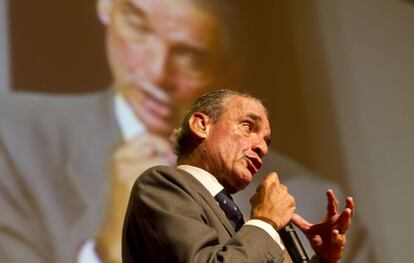“Judges serve as political instruments”
Former banker jailed for fraud has turned politician

Five years after being released from prison, Mario Conde, the disgraced former banker-turned-politician, believes that radical changes are needed to do away with Spain’s closed electoral system and reform the country’s highly politicized judiciary. And Conde says he and his new formation, Civil Society and Democracy (SCD), will accomplish this, starting at the grassroots level in Galicia, with the hope of moving on to the national scene within the next two general elections.
The 64-year-old Conde has been promoting his movement — while at the same time continuing to maintain his innocence in the embezzlement and document forgery cases that rocked Spain in the early 1990s — through a series of books he has authored and with regular appearances on late-night talk shows.
Conde is running for a seat in the Galician parliament representing Pontevedra under the SCD in the upcoming regional elections. But the former Banesto bank president claims his political enemies are doing all they can to keep him off the October 21 ballot, and want to tarnish his reputation as a reformer.
On October 1, High Court Judge Fernando Grande-Marlaska ordered the embargo of four properties in Can Botana, Mallorca, on suspicion that they are owned by Conde who has them listed through a ghost company, Beteiligung SA, registered in Luxembourg. The court reportedly moved against the homes saying that Conde never paid his part of the 27 million euros he and other Banesto board members were ordered to return to stockholders from the embezzlement that took place at the bank in the late 1980s and early 1990s, according to press reports.
In a statement posted on the SCD website, Conde denies he owns the properties and challenges the High Court to send a judicial commission to Luxembourg to find who is behind Beteiligung.
“Why now? What has happened? Haven’t they had time in the past 12 years? What is new?” he asks in his statement. “Legally, nothing new has developed. What is new is that I have decided to run in the Galician parliamentary elections.”
Conde states he has been a victim of politically tainted judges throughout his legal battles. “I have always said judges on many occasions serve as instruments of politics.”
In 1997, Conde was sentenced to six years for profiting from 600 million pesetas (about $4.8 million at the time) in a Banesto transfer to an offshore company. The presiding judge in the so-called Argentia Trust case was Ventura Pérez Mariño, a magistrate who also served as a Socialist Party lawmaker.
When he asked the prosecutor’s office, as well as the Supreme Court, to send a judicial commission to Switzerland to verify whether he had any money deposited in the account at EBC Banking Corporation, the two institutions denied his requests. His late wife Lourdes Arroyo, with the help of a Spanish judge, successfully obtained documents that showed Conde never “touched” any of the money in the account, he said. But it was too late — he had already been released after 16 months for good behavior.
He then attempted a brief stint in politics, including trying to run for a seat in parliament but with no success.
In 2002, the Supreme Court sentenced him to 20 years for illegal enrichment and document fraud stemming from the Banesto case. He said that one of the justices that handed down the ruling was José Antonio Martín Pallín, a member of the United Left (IU). Like Pérez Mariño and Conde himself, Martín Pallín was also a Galician. Conde was finally released in October 2007.
Known as “the shark” because of his flamboyant lifestyle, Conde came to symbolize the get-rich-quick schemes of the 1980s when Spain was just waking up from decades-long stagnation under the Franco regime. Conde’s photographs with important politicians, movie stars, athletes and King Juan Carlos flashed across the covers of gossip magazines then.
Born in Tui, near the Portuguese border, Conde studied law and started his career in the pharmaceutical business in which he made a lot of money, as he once said, after selling his company in 1987 to an Italian conglomerate. At the time it was described as the largest Spanish financial transaction.
He invested his money in Banco Español de Credito (Banesto) and came on board as a vice president along with his longtime pharmaceutical partner Juan Abelló. From that position he successfully fought a hostile takeover by BBVA — the first of its kind in Spain. At 39, he was made president of Banesto but he would only last some six years in the job.
By 1993 there had been rumors that Banesto was on the verge of collapse because of holes in its books. That December, the Bank of Spain intervened and fired Conde. With nearly five billion euros missing, the Banesto case was the largest banking scandal in Spain up to that time — a miniscule amount compared to the reported 26 billion euros in losses Bankia would rake up nearly 20 years later.
Tu suscripción se está usando en otro dispositivo
¿Quieres añadir otro usuario a tu suscripción?
Si continúas leyendo en este dispositivo, no se podrá leer en el otro.
FlechaTu suscripción se está usando en otro dispositivo y solo puedes acceder a EL PAÍS desde un dispositivo a la vez.
Si quieres compartir tu cuenta, cambia tu suscripción a la modalidad Premium, así podrás añadir otro usuario. Cada uno accederá con su propia cuenta de email, lo que os permitirá personalizar vuestra experiencia en EL PAÍS.
¿Tienes una suscripción de empresa? Accede aquí para contratar más cuentas.
En el caso de no saber quién está usando tu cuenta, te recomendamos cambiar tu contraseña aquí.
Si decides continuar compartiendo tu cuenta, este mensaje se mostrará en tu dispositivo y en el de la otra persona que está usando tu cuenta de forma indefinida, afectando a tu experiencia de lectura. Puedes consultar aquí los términos y condiciones de la suscripción digital.








































